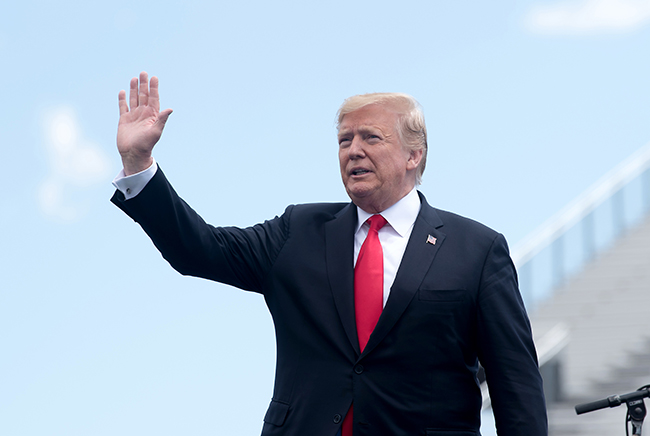
The Office of Management and Budget said June 11 that advisers to President Donald Trump, shown here at the US Air Force Academy last month, would tell him to oppose a House "minibus" spending bill that does not include funds for several key Defense Department efforts. Air Force photo by Trevor Cokley.
The Office of Management and Budget this week came out against a 2020 “minibus” spending package, slated to be taken up on the House floor June 12, which largely denies funding for President Donald Trump’s Space Force and a barrier at the southern US border.
The nearly $983 billion bill offers $690.2 billion in Defense Department funding—about $16 billion more than enacted for 2019—and $68.1 billion for defense-related overseas contingency operations, after shifting a large portion of the administration’s OCO request back into the base budget. Defense spending is wrapped in with funds for labor, health and human services, education, State Department, foreign operations, and energy and water development initiatives.
“This framework would raise the discretionary spending caps by more than $350 billion in fiscal years 2020 and 2021 and does not reflect either a House-passed budget resolution or a bipartisan, bicameral agreement,” OMB said June 11. “It would put the federal government on track to add nearly $2 trillion to deficits over 10 years, adding significantly to the national debt, which is already more than $22 trillion and rising. … House Democrats’ framework continues to adhere to the misguided and unfounded notion that increases to defense spending must be matched or exceeded by increases to non-defense spending.”
Trump’s advisers are encouraging him to veto the bill in its current form, noting that several Air Force efforts, including the Ground-Based Strategic Deterrent, Next-Generation Air Dominance, and Next-Generation Overhead Persistent Infrared, receive less money than requested in the 2020 budget submission.
Any spending bill needs to reach a bipartisan consensus between the House and Senate before it reaches the President’s desk.
